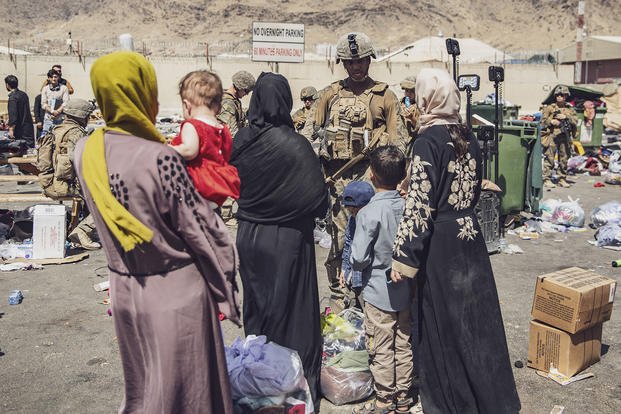Thousands of Afghans brought to the United States during the chaotic American military evacuation after the Taliban overran Kabul remain in a legal limbo nearly a year later, unsure whether they will be able to remain in their new country when their temporary immigration status expires soon.
Meanwhile, as the one-year anniversary of the withdrawal approaches, veterans groups have not let up efforts to get out the estimated 78,000 Afghans who aided the 20-year effort but were left behind when the last U.S. troops departed.
A bipartisan, bicameral group of lawmakers is taking initial steps to fix the immigration status of those who did make it out ahead of the U.S. withdrawal, introducing bills in the House and Senate this week to allow the Afghan refugees to permanently stay in the United States.
Read Next: Air Force Allows Facebook Comments Criticizing the Service Online After Veteran's Lawsuit
Supporters are hopeful the bill will become law, but the clock is ticking on both the legislative calendar and the Afghans' immigration status, with the August recess meaning a fix likely can't come in time for Afghans already in the U.S. before some see their legal status expire. The bill also contains several provisions meant to ease ongoing relocations.
"We're hopeful that passing this bill won't be as hard as passing the PACT Act," said Shawn VanDiver, a Navy veteran and president of the #AfghanEvac Coalition, referring to a veterans benefits bill that passed Congress last week after veterans camped outside the U.S. Capitol, protesting for several days straight. "It shouldn't take veterans standing watch in the hot sun to great physical detriment to get people to take action."
Monday will mark the one-year anniversary of Kabul falling to the Taliban, swiftly reversing many of the efforts of the longest war in U.S. history. The Taliban's victory set off a scramble among U.S. officials to evacuate as many vulnerable Afghans as possible before the Biden administration's self-imposed withdrawal deadline of Aug. 31, 2021.
Throngs of Afghans desperate to get onto a U.S. military flight swarmed the Kabul airport, leading to chaotic and heartbreaking scenes, including Afghans who had clung to the side of an American C-17 Globemaster III plummeting to their deaths as the aircraft ascended into the sky. Amid the chaos of the evacuation, the Afghan branch of ISIS carried out a suicide bombing that killed 13 U.S. troops.
By the time the last American forces departed just before midnight of the withdrawal deadline, more than 76,000 Afghans had been evacuated. Still, the majority of Afghans who worked as interpreters or otherwise helped the U.S. military and are eligible for what's called Special Immigrant Visas, or SIVs, were left behind, with advocates estimating that number was around 78,000 people plus family members.
Work on extracting the Afghans left behind continues. While declining to discuss specific numbers on the record, VanDiver, who meets with State Department officials weekly, said relocations of Afghans are ongoing. He said he's satisfied with the relocation process that's been put in place, but still said more could be done.
"More and faster, that's the best way I can describe it," he said. "I want to see a lot more relocations and a lot faster."
Matt Zeller, co-founder of No One Left Behind, an SIV support organization, said he fears many of those left behind have already been killed, based on anecdotal reports and preliminary results from a survey conducted by two organizations he works with, the Association of Wartime Allies and Iraq and Afghanistan Veterans of America.
"Just yesterday, an interpreter that I've been trying to get out since the evac -- poor guy who was on the freakin' airfield the night Kabul fell … he texted me just yesterday morning at 11 o'clock in the morning our time to tell me that a friend of his, a former interpreter, had been killed by the Taliban," Zeller said Monday.
Of the Afghans who made it to the United States last August, most were brought under a temporary immigration status known as humanitarian parole, which allows people otherwise ineligible to enter the United States to come into the country temporarily for emergency humanitarian reasons.
Parole does not provide a pathway to apply for legal permanent resident status, more casually known as green cards. Some Afghan refugees were given two years of protection to stay in the United States, but some were given only one -- meaning they have weeks until they technically won't be in the United States legally anymore.
The Afghan Adjustment Act, which was introduced in the House on Tuesday and the Senate on Sunday, would create a streamlined process for the evacuated Afghans to get green cards. The Department of Homeland Security would also have to establish new vetting procedures for the Afghans seeking green cards.
Supporters of the bill have likened it to similar measures passed after other U.S. conflicts, such as for Vietnamese and other South Asian refugees after the fall of Saigon.
"We must keep our commitment to provide safe, legal refuge to those who willingly put their lives on the line to support the U.S. mission in Afghanistan," Rep. Earl Blumenauer, D-Ore., the lead sponsor of the House bill, said in a statement. "Congress has provided a legal adjustment process for previous wartime evacuations and humanitarian crises and should do so once again, without delay."
The bill also seeks to fix issues with the SIV program, such as the requirement that interviews be conducted at the U.S. Embassy in Kabul, which no longer exists. Instead, the bill would establish a new State Department office to conduct interviews for visa applicants and carry out other duties that would have otherwise been the responsibility of the embassy. It also creates an "Interagency Task Force on Afghan Ally Strategy" to develop a plan to support SIV and refugee applicants.
The bill would also extend special immigrant status to certain former Afghan troops, including former members of the Afghanistan National Army Special Operations Command, the Afghan Air Force, the Special Mission Wing of Afghanistan and the Female Tactical Teams of Afghanistan.
"Giving them that statutory requirement will make sure that, no matter what happens in politics, that these folks get to realize the American Dream that they've earned," VanDiver said.
The introduction of the stand-alone bills is the most public progress made on the issue since May, when the Biden administration requested Congress include an Afghan Adjustment Act in a Ukraine aid bill. The proposal was left out of that bill amid objections from Republicans.
Supporters of the Afghan Adjustment Act have specifically blamed Sen. Chuck Grassley, R-Iowa, ranking member of the Senate Judiciary Committee, for not signing off on including it in the Ukraine bill. A spokesperson for Grassley did not respond to Military.com's request for comment Tuesday.
Grassley has previously expressed concern about vetting of the Afghan refugees, saying in a statement Friday that Congress "should not even begin to consider proposals related to sweeping immigration status changes for evacuees, such as an Afghan Adjustment Act, until the Biden administration, at the very least, guarantees the integrity of and fully responds to long-standing congressional oversight requests regarding the vetting and evacuee resettlement process."
Supporters of the bill are hopeful for its chances now that it has bipartisan co-sponsors. The House bill is co-sponsored by Reps. Peter Meijer, R-Mich.; House Judiciary Committee Chairman Jerrold Nadler, D-N.Y.; Adam Kinzinger, R-Ill.; Zoe Lofgren, D-Calif.; Mariannette Miller-Meeks, R-Iowa; Jason Crow, D-Colo.; Fred Upton, R-Mich.; and Scott Peters, D-Calif. The Senate bill was introduced by Sens. Amy Klobuchar, D-Minn.; Lindsey Graham, R-S.C.; Chris Coons, D-Del.; Roy Blunt, R-Mo.; Richard Blumenthal, D-Conn.; and Lisa Murkowski, R-Alaska.
But even with bipartisan support, the bill still faces hurdles, including a legislative calendar truncated by election season and with several priorities competing for floor time. Passing the measure before the end of this Congress in January could be done by attaching the measure to a must-pass bill such as one to fund the government when the fiscal year ends Sept. 30, but that is still after some Afghans' immigration status is set to expire at the end of August.
"This is not a matter of immigration. This is a national security issue," Zeller said. "This is down to, are we going to be able to have allies in the future going forward and future wars? Because allies, quite frankly, equals fewer American deaths."
-- Rebecca Kheel can be reached at rebecca.kheel@military.com. Follow her on Twitter @reporterkheel.
Related: 10 Months Later, Afghan Refugees Labor to Build New Lives in US












